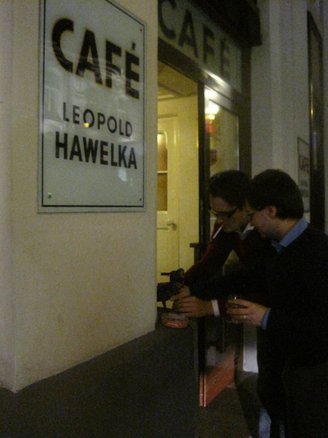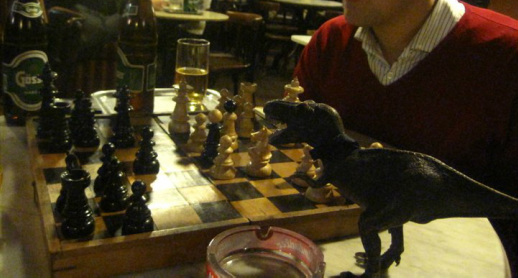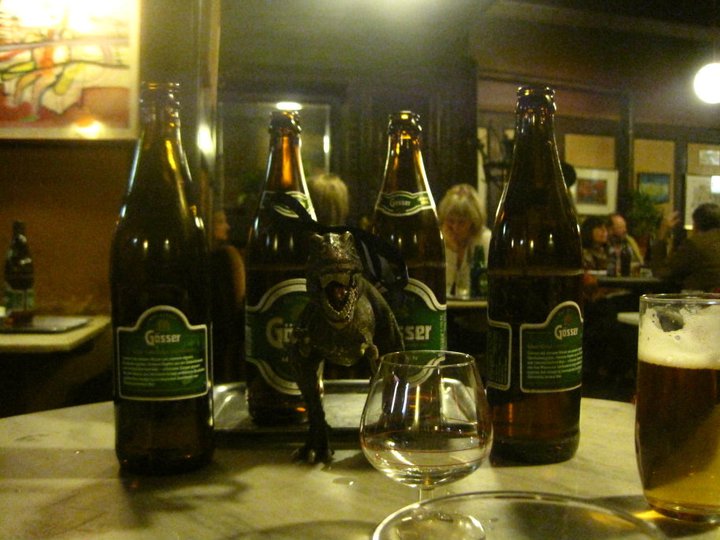Some months after I moved to Vienna I sought counsel from a friend for an unpleasant situation I’d found myself in. He listened quietly and patiently throughout, including my indulgence in several long-winded details.
“Well, what do you think I should do?” I finally asked to break his composure.
“That depends on how much you want to suffer,” he said, composed.
After a pause, during which we both expected a response from the other, he
clarified, “You must first decide how much suffering you can tolerate. Then, stay in
the situation as long as it doesn’t pass that threshold.”
“I get that. But why would I want to suffer?”
“Because it’s fun.”
“No. Fun is fun.” Another pause – I had perplexed him.
“Ah, I forgot,” he said. “You’re an American. Americans like to be happy. I’m Russian. Russians like to suffer.”
“Well, what do you think I should do?” I finally asked to break his composure.
“That depends on how much you want to suffer,” he said, composed.
After a pause, during which we both expected a response from the other, he
clarified, “You must first decide how much suffering you can tolerate. Then, stay in
the situation as long as it doesn’t pass that threshold.”
“I get that. But why would I want to suffer?”
“Because it’s fun.”
“No. Fun is fun.” Another pause – I had perplexed him.
“Ah, I forgot,” he said. “You’re an American. Americans like to be happy. I’m Russian. Russians like to suffer.”

If Americans like to be happy, and Russians like to suffer, then Austrians like to raunzen. I was first introduced to this word while an Austrian friend of mine was taking a short trip out of Vienna. He sent me an unrelenting number of text messages: the train was stinky, the beer was awful, the windows were dirty, the lady sitting beside him was unpleasant…
In response to each text, I offered suggestions for what he could do (eg: open the window, order another drink). Finally he texted (in all caps): ICH WILL JETZT RAUNZEN! (I WANT TO RAUNZEN NOW!)

The point of raunzen was at first incomprehensible to me. Raunzen seemed pointless and a waste of time. The tedious details one offers when speaking about an unpleasant situation ought to be approached as one does a math word problem: isolate the relevant bits that find a solution.
Since living longer in Vienna, I’ve begun to grasp this concept. I'd become acquainted with the Russian and the Austrian in the famous Café Hawelka. These regulars sat for hours in what is called “their second living room” smoking cigars, drinking terrible coffee, and complaining about the new waiter, the cups, the “bloody” tourists, etc. Yet they’ve frequented this café for over ten years now, to the point where mail will be delivered to them there. Raunzen is a privilege granted to the regulars – it binds them to the café and each other.
Since living longer in Vienna, I’ve begun to grasp this concept. I'd become acquainted with the Russian and the Austrian in the famous Café Hawelka. These regulars sat for hours in what is called “their second living room” smoking cigars, drinking terrible coffee, and complaining about the new waiter, the cups, the “bloody” tourists, etc. Yet they’ve frequented this café for over ten years now, to the point where mail will be delivered to them there. Raunzen is a privilege granted to the regulars – it binds them to the café and each other.

This raunzening Austrian I mentioned early was perpetually lagging a few feet behind me one evening while we were taking a walk. When I, annoyed, asked him why he was walking so slowly he responded, “Where are we going?”
“Nowhere,” I conceded.
“Then what’s the rush?”
“Isn’t is boring?!” was my automatic response.
Perhaps it’s not happiness that Americans are pursuing, rather boredom that we are running way from. After all, it does seem too obvious to pursue happiness in order to be happy.
In Thomas Mann’s short story Disillusionment, the narrator is asked by a strange man in regards to his trip to Venice, “Does it come up to your expectations? Surpasses them, eh? You did not picture it as finer than the reality? You mean it? You would not say so in order to seem happy and enviable?” He then continues to recount the disillusionments of his life. Regarding his unrequited love he says, “So this is the greatest pain we can suffer. Well, and what then – is that all?” On seeing extravagantly praised works of art, “It is beautiful. And yet – is that all? Is it no more beautiful than that?”
Maybe Austrians see the world through rauzen-colored-lenses, preferring its bitterness to the irreversible blandness of disillusionment and disappointment that comes with resolving these raunzen-able situations. Raunzen is an expression of life, how one feels and is touched. When one is against something, he feels his own will. And as long as one raunzens, he is is not alone - if only in connection to the patient listening.
A couple years ago the Europen Union smoking ban was implemented in Austria, prohibiting smoking in Café Hawelka. Some smoking regulars have left to find a new place to set roots and cigar ashes, but many have begrudgingly stayed. After all, with the new smoking-ban they have lots of raunzening to do.
A couple years ago the Europen Union smoking ban was implemented in Austria, prohibiting smoking in Café Hawelka. Some smoking regulars have left to find a new place to set roots and cigar ashes, but many have begrudgingly stayed. After all, with the new smoking-ban they have lots of raunzening to do.



 RSS Feed
RSS Feed